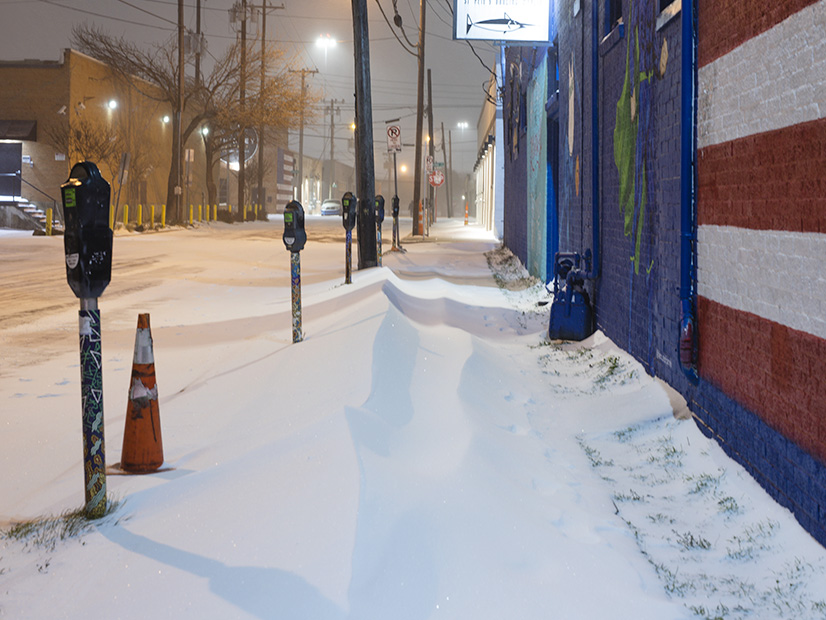
A snow-covered sidewalk in Deep Ellum, Texas, during the February 2021 winter storm.
| Matthew T. Rader, CC BY-SA 4.0, via Wikimedia CommonsFERC dealt another rejection to security activist Michael Mabee on Wednesday, denying his request for an investigation into the widespread power outages resulting from February’s cold snap despite intervenors supporting his contentions of lax regulatory oversight on the Texas power grid (EL21-54).
Mabee filed his complaint on Feb. 28, not long after the winter storm that led to record cold temperatures in Texas, causing energy demand to skyrocket while multiple generation units went offline. At one point Texas reported more than 52 GW of generation loss, amounting to 48.6% of the state’s total installed generation capacity, and millions of Texans lost power for hours or even days.
Amid the crisis, Texas citizens and government officials turned their ire on Slow Storm Restoration Sparks Anger in Texas, South.) Mabee’s February filing expanded this viewpoint to cover NERC and the Texas Reliability Entity: He called the crisis “the failure of electric reliability standards” and demanded FERC order both entities to conduct an investigation into whether utilities were negligent in applying NERC’s standards.

In a blog post on his personal website, Mabee, who lives in Texas, admitted his FERC complaint had a personal edge, as his own family lost power for more than 36 hours amid sub-zero temperatures. Writing to FERC, he focused on the Texas cold weather-related blackouts of 1989 and 2011, both of which he said were “followed by many promises” — respectively in the form of a report by the Public Utility Commission of Texas and a joint FERC-NERC inquiry — “but little action.”
“I implore the commission: Stop asking and recommending. It is time to direct NERC and Texas RE to take action,” Mabee wrote, requesting the commission order a “comprehensive investigation” by NERC and Texas RE into “whether reliability standards were followed by all entities” involved in the February outages.
Mabee also reminded FERC of his previous complaints about NERC’s Critical Infrastructure Protection (CIP) standards that the commission rejected last year (EL20-46) and warned that deficiencies in one area could indicate much wider problems. (See FERC Denies Mabee’s CIP Complaint.)
“If we are not adequately prepared for a weather event that is forecast well in advance … are we ready for other threats?” he said. “Are we prepared for a cyberattack … a coordinated physical attack … a major geomagnetic disturbance (GMD) event [or] other extreme weather events?”
Many Critics of 2011 Follow-up
Mabee is far from the only observer to note the apparent lack of follow-on actions in response to the 2011 outages: Several members of the Senate Energy and Natural Resources Committee told NERC CEO Jim Robb during a meeting in March that Texas utilities “probably didn’t follow your recommendations very well.” (See Senators Grill Robb, Asthana over Texas Outages.)
In a supportive filing, the Secure the Grid Coalition — a group of “policy, energy and national security experts, legislators, and industry insiders” — called reliability standards “insufficient and underenforced” and requested that FERC “thoroughly investigate the February 2021 blackout … to determine how FERC could have made a material difference by [promoting] economic incentives for grid resilience.”
FERC itself has indicated some agreement that measures taken after 2011 were insufficient: Chairman Richard Glick reminded colleagues at the commission’s February meeting that after the 2011 events, FERC relied on “voluntary guidance to protect the public,” noting that “we don’t have to guess how effective that was.” (See Glick May Seek New Standards Following Texas Outages.)
But in denying Mabee’s request, the commission noted that he had not provided any evidence either of specific reliability standard violations that contributed to the February outages, or of deficiencies in the standards that could have prevented the disaster if corrected. Moreover, FERC referred to its ongoing joint inquiry with NERC — with which Texas RE is assisting — as evidence that “adequate steps are being taken” to evaluate the problem.
“These efforts will create a record about the causes of the February 2021 cold weather event as well as consider the potential for future extreme weather events that will, in turn, inform any decision on the need for further action, including possible new or modified reliability standards,” the commission said. “Moreover, these efforts appear to address certain relief that was requested by the complaint.”



